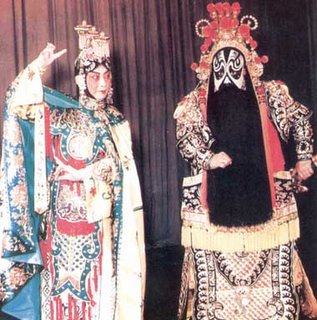drama with a capital D

Perhaps it's just better to enjoy someone else's drama than to create my own. Which I'm oh, so good at.
I'm sure The Thorn Birds is seen as quite cheesy. And perhaps it is. But I think it's well crafted (the book and the movie). Verdi's librettists certainly couldn't come up with that level of tragedy. Think about it. A fire that nearly destroys a sheep station and kills Meggie's father. Her brother finds his father's body when a search party is out. The brother fires his gun to alert the others, which also, unfortunately for him, alerts a wild boar. The wild boar gores the brother, so that the remaining family finds a dead father AND brother.
Years and years and years of mothers neglecting their daughters.
A priest who has loved a woman his entire life, fathers a child with her, and learns that the child is his only after the child has drowned (and of course, taken his priest's vows). Classic.
I really appreciate major tragedy. Another excellent example of pure tragedy is Farewell My Concubine. Perfect, perfect ending. I don't think there could ever be a more perfect ending in a tragedy. The two Chinese opera singers in the film bond when they are training with a band of musicians in which the director is severely abusive, experience a meteoric rise to stardom, and lose everything they have in the Cultural Revolution.
The synopsis of their most famous opera is as follows (thanks to http://www.princeton.edu/~his325/week3/Opera/scenes.html):
The King Bids Farewell to his Concubine (Bawang bie ji)
At the end of the great Qin dynasty, (221-206 B.C.), rival forces battled for the control of the empire. Finally only the armies of the great general Xiang Yu and the commoner Liu Bang were left. In a decisive battle in 202 B.C., Xiang Yu's troops were defeated by Liu Bang, who went on to become the founder of the Han dynasty. This opera focuses on Xiang Yu and his beloved concubine Yu at the moment of Xiang Yu's defeat. Xiang Yu narrates the story of the battle and expresses his grief as his soldiers are slaughtered. Concubine Yu tries to console Xiang Yu by offering him wine, but inwardly decides to take her own life to express her allegience to her king. She performs a daring dance with Xiang Yu's two swords as the king looks on. At the end of the dance, Concubine Yu kills herself with the sword.
The opera singers reunite a few decades later, and naturally, the singer playing the concubine actually does kill himself with the sword.


0 Comments:
Post a Comment
<< Home